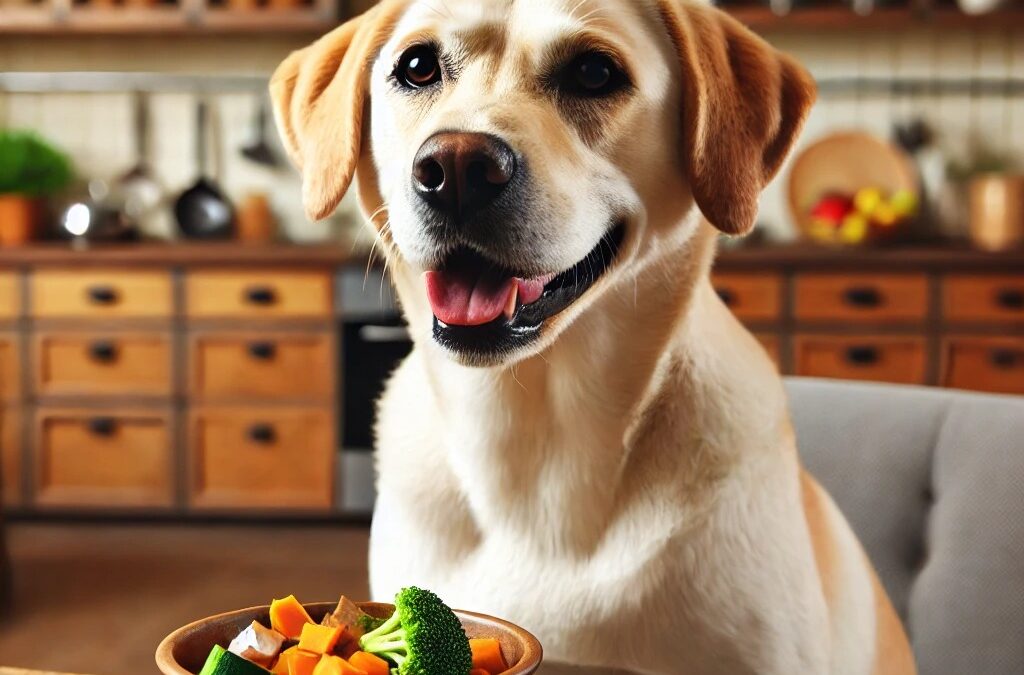
by TCMVET | Jul 23, 2024 | Food & Health
Canine cancer is a formidable foe, with many pet owners searching tirelessly for safe and effective treatments to help their beloved companions. In the quest for natural solutions, an unlikely hero emerges from the soil: beets. Known for their vibrant color and nutritional prowess, beets may play a crucial role in supporting the health of dogs battling cancer. In this article, we’ll explore how incorporating beets into your dog’s diet could be a game-changer in the fight against canine cancer.
The Nutritional Powerhouse: What Makes Beets Special?
Beets are rich in vitamins, minerals, and antioxidants, making them an excellent addition to any diet, including that of our canine friends. The key components that set beets apart are betalains, a type of phytonutrient that has been shown to have anti-inflammatory and detoxifying effects. These nutrients are not only responsible for the deep red color of beets but also their potential anti-cancer properties.
Scientific Backing: Beets in Canine Cancer Research
Recent studies have started to shed light on the potential benefits of beets for dogs with cancer. Research indicates that the antioxidants in beets can help reduce the proliferation of cancer cells. Betalains, in particular, have been studied for their ability to inhibit the growth of tumor cells and support the body’s natural defense systems.
Dietary Integration: How to Safely Introduce Beets to Your Dog’s Diet
Introducing beets to your dog’s diet should be done gradually and under the guidance of a veterinarian, especially if your dog is undergoing cancer treatment. Here are a few tips for incorporating beets into your dog’s meal plan:
- Start Small: Begin with small amounts of cooked beets to see how your dog reacts.
- Cooked vs. Raw: Cooked beets are easier for dogs to digest than raw beets, which can be tough on their stomach.
- Organic is Best: Opt for organic beets to avoid pesticides and chemicals that could harm your dog’s health.
Case Studies and Testimonials: Real Dogs, Real Results
Many pet owners have reported positive changes in their dogs’ health and vitality after adding beets to their diet. These anecdotal evidences, while not scientifically rigorous, suggest that beets may offer supportive benefits in managing cancer symptoms and improving quality of life.
A Colorful Addition to Cancer Care
While beets are not a cure for cancer, their nutritional benefits make them a worthy addition to the diet of a dog fighting cancer. As with any dietary change, it’s important to consult with your veterinarian to ensure it’s appropriate for your pet’s specific health needs.
Incorporating beets into your dog’s diet could provide a splash of color and a boost of health. With their impressive profile of nutrients and potential to support cancer care, beets are becoming a popular choice among pet owners looking for natural ways to support their dogs through cancer treatment.

by TCMVET | Jul 20, 2024 | Food & Health
Vitamin K1, also known as phylloquinone, is an essential nutrient that plays a critical role in your dog’s health. Often overlooked, Vitamin K1 is crucial for blood clotting and bone health. This article delves into the transformative benefits of Vitamin K1 tablets for dogs, providing insights into how this powerful supplement can enhance your pet’s well-being.
Why Vitamin K1 is Essential for Dogs
Vitamin K1 is vital for several physiological functions in dogs:
- Blood Clotting: Vitamin K1 is essential for the synthesis of certain proteins required for blood clotting. A deficiency can lead to uncontrolled bleeding, which can be life-threatening.
- Bone Health: Vitamin K1 contributes to bone metabolism by aiding in the regulation of calcium. It helps in the formation and maintenance of strong, healthy bones.
- Cardiovascular Health: Vitamin K1 helps prevent calcification of the arteries, promoting overall cardiovascular health.
Benefits of Vitamin K1 Tablets for Dogs
- Effective Treatment for Poisoning:
- Rodenticide Poisoning: One of the most common uses of Vitamin K1 tablets in veterinary medicine is the treatment of rodenticide poisoning. These poisons inhibit Vitamin K1 activity, leading to severe bleeding. Administering Vitamin K1 can reverse these effects and save your dog’s life.
- Supports Healing:
- Post-Surgery Recovery: Vitamin K1 can be beneficial in the recovery process after surgeries, ensuring proper blood clotting and reducing the risk of excessive bleeding.
- Enhances Bone Strength:
- Bone Disorders: For dogs with bone disorders or those prone to fractures, Vitamin K1 tablets can help improve bone density and strength, supporting overall skeletal health.
- Improves Cardiovascular Function:
- Heart Health: Regular supplementation can aid in maintaining cardiovascular health by preventing arterial calcification, ensuring your dog’s heart remains strong and healthy.
How to Administer Vitamin K1 Tablets
Administering Vitamin K1 to your dog should always be done under the guidance of a veterinarian. The dosage and duration will depend on the specific needs and health conditions of your pet. Here are some general guidelines:
- Consult Your Vet: Always start with a veterinary consultation to determine the appropriate dosage and frequency.
- Follow Instructions: Administer the tablets as per the vet’s instructions. Consistency is key to ensuring the effectiveness of the treatment.
- Monitor Your Dog: Keep an eye on your dog for any adverse reactions or side effects. Common side effects are rare but can include gastrointestinal upset.
Natural Sources of Vitamin K1
While supplements are effective, incorporating natural sources of Vitamin K1 into your dog’s diet can provide additional health benefits:
- Leafy Greens: Vegetables like spinach, kale, and broccoli are rich in Vitamin K1 and can be added to your dog’s meals in moderation.
- Herbs: Parsley and basil are also excellent sources of Vitamin K1 and can be sprinkled on your dog’s food.
Unlocking the power of Vitamin K1 tablets can significantly enhance your dog’s health, providing crucial support for blood clotting, bone strength, and cardiovascular function. Whether addressing specific health issues like rodenticide poisoning or promoting overall wellness, Vitamin K1 is an invaluable addition to your dog’s health regimen. Always consult with your veterinarian to ensure your dog receives the right dosage and benefits from this essential nutrient. By integrating Vitamin K1 into your dog’s diet and health plan, you can help ensure they lead a healthier, happier life.

by TCMVET | Jul 20, 2024 | Food & Health
Aspergillosis is a serious fungal infection that affects dogs, causing significant respiratory issues and general discomfort. Traditional treatments can be harsh, and pet owners are increasingly seeking natural alternatives to help their furry friends heal without the side effects of conventional medication. This article explores various natural treatments for aspergillosis in dogs, offering holistic approaches to boost your dog’s health and improve their quality of life.
Understanding Aspergillosis in Dogs
Aspergillosis is caused by the Aspergillus fungus, commonly found in soil, decaying vegetation, and dust. Dogs can inhale the spores, leading to respiratory infections. Symptoms include nasal discharge, sneezing, coughing, and in severe cases, fever and lethargy. Early diagnosis and treatment are crucial to prevent the infection from spreading and causing more severe health issues.
Benefits of Natural Treatments
Natural treatments can offer several advantages over conventional medications. They are generally less toxic, have fewer side effects, and can support the overall well-being of your dog. Additionally, holistic approaches often address the root cause of the illness, promoting long-term health and resilience.
Top Natural Treatments for Aspergillosis in Dogs
- Herbal Remedies
- Olive Leaf Extract: Known for its powerful antifungal properties, olive leaf extract can help combat fungal infections from within.
- Echinacea: This herb boosts the immune system, helping your dog fight off infections more effectively.
- Turmeric: With its anti-inflammatory and antifungal properties, turmeric can reduce symptoms and support healing.
- Essential Oils
- Tea Tree Oil: Diluted tea tree oil can be used in a diffuser to help clear respiratory pathways. Ensure it is used safely, as undiluted tea tree oil can be toxic to pets.
- Lavender Oil: Known for its calming effects, lavender oil can help reduce stress and promote better breathing.
- Dietary Supplements
- Probiotics: A healthy gut can significantly enhance your dog’s immune response. Probiotics can help maintain a balanced gut flora.
- Vitamin C: An antioxidant that supports the immune system and helps reduce inflammation.
- Home Environment Adjustments
- Air Purifiers: Using an air purifier can reduce the number of airborne spores your dog is exposed to, helping to prevent and manage infections.
- Clean Living Spaces: Regularly cleaning your dog’s living areas can reduce the risk of exposure to Aspergillus spores.
- Nutritional Support
- Raw or Natural Diet: Feeding your dog a diet rich in natural, unprocessed foods can boost their immune system and overall health.
- Hydration: Ensure your dog has access to clean, fresh water at all times to help flush out toxins and support bodily functions.
Consultation with a Holistic Veterinarian
While natural treatments can be beneficial, it is essential to consult with a holistic veterinarian before starting any new regimen. A professional can provide guidance tailored to your dog’s specific needs and ensure that treatments are safe and effective.
Aspergillosis in dogs can be a challenging condition to manage, but natural treatments offer a promising avenue for those seeking gentle, holistic approaches. By incorporating herbal remedies, essential oils, dietary supplements, and environmental adjustments, you can support your dog’s health and well-being. Always remember to consult with a holistic veterinarian to create a comprehensive treatment plan that is best suited for your furry friend.

by TCMVET | Jul 19, 2024 | Food & Health
In the realm of natural health remedies, dandelion root emerges as a remarkable yet often overlooked ally for canine wellness. Renowned for its myriad health benefits in humans, this humble plant also holds tremendous potential for improving the health of our four-legged friends. This article explores the multifaceted benefits of dandelion root for dogs, offering insights into how it can be safely integrated into your pet’s diet.
What is Dandelion Root?
Dandelion root comes from the dandelion plant, scientifically known as Taraxacum officinale. It is recognized for its long, taproot and rosette of leaves. Traditionally used in herbal medicine, every part of the dandelion plant is edible and is known for its health-promoting properties, with the roots being particularly potent.
Key Benefits of Dandelion Root for Dogs
1. Liver Support
Dandelion root acts as a liver tonic, helping to detoxify the liver, stimulate bile production, and improve digestion. This is particularly beneficial for dogs on medication or those with liver diseases.
2. Kidney Health
It serves as a natural diuretic, promoting kidney function by helping to eliminate excess water and toxins from the body. This can be crucial for dogs with kidney issues or those needing extra help managing waste.
3. Digestive Health
Rich in inulin, a type of soluble fiber, dandelion root supports gut health by fostering the growth of beneficial bacteria. This can help improve digestive irregularities and boost overall immune function.
4. Anti-inflammatory Properties
The anti-inflammatory properties of dandelion root can help alleviate pain and swelling associated with conditions like arthritis, making it a soothing supplement for senior dogs.
How to Include Dandelion Root in Your Dog’s Diet
Dandelion root can be administered to dogs in various forms, including teas, powders, or capsules specifically formulated for pets. Fresh dandelion leaves can also be added to meals, although moderation is key to avoid digestive upset.
Safety and Dosage Considerations
While dandelion root is generally safe, it’s essential to consult with a veterinarian before introducing it into your pet’s regimen, especially if your dog has a pre-existing health condition or is on medication. A professional can provide guidance on the appropriate dosage and ensure that the supplement does not interfere with other treatments.
Dandelion root is a potent natural remedy that offers a range of health benefits for dogs, from liver and kidney support to anti-inflammatory effects and digestive health improvement. By incorporating this powerful plant into your dog’s diet under veterinary guidance, you can help support their overall health and well-being naturally.

by TCMVET | Jul 18, 2024 | Food & Health
When faced with the daunting diagnosis of cancer in our beloved dogs, we often seek every possible avenue to support their health and well-being. Among the natural remedies gaining attention is rosehip oil, a powerful supplement that can provide significant benefits for dogs battling cancer. This article explores the potential of rosehip oil as a natural ally in the fight against canine cancer, offering insights into its properties, benefits, and how to incorporate it into your dog’s care routine.
What is Rosehip Oil?
Rosehip oil is derived from the seeds of the wild rose bush (Rosa canina). It is renowned for its rich content of essential fatty acids, vitamins, and antioxidants, making it a potent natural remedy for various health issues. Its anti-inflammatory and immune-boosting properties have made it a popular choice in holistic pet care.
The Benefits of Rosehip Oil for Dogs with Cancer
- Anti-Inflammatory Properties Inflammation is a common issue in dogs with cancer, contributing to pain and discomfort. Rosehip oil’s anti-inflammatory properties can help reduce inflammation, providing relief and improving your dog’s quality of life.
- Rich in Antioxidants Rosehip oil is packed with antioxidants, including vitamins C and E, which help combat oxidative stress. Oxidative stress can accelerate cancer progression, so incorporating antioxidants into your dog’s diet can support their immune system and overall health.
- Immune System Support A robust immune system is crucial for dogs battling cancer. The nutrients in rosehip oil, such as vitamin C, can enhance immune function, helping your dog fight off infections and potentially slowing cancer progression.
- Skin and Coat Health Cancer treatments can often lead to skin issues and a dull coat. The essential fatty acids in rosehip oil promote healthy skin and a shiny coat, helping your dog look and feel better during their treatment.
- Digestive Health Rosehip oil can also support digestive health, which is essential for dogs undergoing cancer treatment. It can help soothe the digestive tract, reduce inflammation, and promote nutrient absorption.
How to Incorporate Rosehip Oil into Your Dog’s Diet
Introducing rosehip oil into your dog’s diet can be simple and effective. Here are a few methods to consider:
- Add to Food The easiest way to give your dog rosehip oil is by adding it to their food. Start with a small amount to ensure your dog tolerates it well and gradually increase to the recommended dosage based on your dog’s size and weight.
- Topical Application For skin and coat benefits, you can apply rosehip oil directly to your dog’s skin. This can be particularly helpful for dogs experiencing skin issues as a side effect of cancer treatments.
- Consult Your Veterinarian Always consult your veterinarian before introducing any new supplement into your dog’s diet, especially when dealing with a condition as serious as cancer. Your vet can provide personalized dosage recommendations and ensure that rosehip oil complements your dog’s overall treatment plan.
Combining Rosehip Oil with Other Treatments
While rosehip oil offers numerous benefits, it is essential to use it as part of a comprehensive cancer treatment plan. Combining rosehip oil with traditional treatments, such as chemotherapy and radiation, as well as other supportive therapies, can provide the best possible outcomes for your dog.
Rosehip oil stands out as a natural ally in the fight against canine cancer, offering anti-inflammatory, antioxidant, and immune-boosting benefits. By incorporating this powerful supplement into your dog’s care routine, you can support their health and enhance their quality of life during this challenging time. Remember to consult with your veterinarian to ensure the best approach for your dog’s unique needs, and embrace the holistic potential of rosehip oil in your dog’s battle against cancer.

by TCMVET | Jul 18, 2024 | Food & Health
As pet owners, the diagnosis of cancer in our beloved dogs can be heart-wrenching. While veterinary treatments are crucial, nutrition plays a significant role in supporting their health and well-being during this challenging time. Creating homemade meals tailored to the needs of dogs battling cancer can provide essential nutrients, improve their quality of life, and complement medical treatments. Here’s a guide to crafting the best homemade meals for dogs fighting cancer.
Understanding the Nutritional Needs of Dogs with Cancer
Cancer can significantly alter a dog’s metabolism, leading to weight loss, muscle wasting, and decreased energy levels. It’s essential to understand the specific nutritional requirements for dogs with cancer:
- High-Quality Protein: Protein helps maintain muscle mass and supports the immune system. Choose easily digestible, high-quality protein sources such as chicken, turkey, fish, and lean beef.
- Healthy Fats: Fats are a vital energy source for dogs with cancer. Omega-3 fatty acids, found in fish oil, flaxseed oil, and chia seeds, have anti-inflammatory properties and can help slow cancer progression.
- Low Carbohydrates: Cancer cells thrive on glucose, so it’s beneficial to limit carbohydrate intake. Opt for low-glycemic vegetables like broccoli, spinach, and cauliflower.
- Antioxidants: Antioxidants help combat oxidative stress and support the immune system. Incorporate foods rich in vitamins A, C, and E, such as carrots, blueberries, and sweet potatoes.
- Hydration: Ensure your dog stays well-hydrated, as cancer and its treatments can lead to dehydration. Add bone broth or water-rich vegetables like cucumbers to their diet.
Recipe Ideas for Homemade Dog Meals
Here are some nutritious and delicious recipes to consider when preparing homemade meals for your dog with cancer:
1. Chicken and Veggie Delight
- Ingredients:
- 1 cup cooked chicken breast (shredded)
- 1/2 cup steamed broccoli (chopped)
- 1/2 cup steamed carrots (chopped)
- 1/4 cup quinoa (cooked)
- 1 tablespoon fish oil
- Instructions:
- Combine all ingredients in a bowl.
- Mix well and serve at room temperature.
- Store leftovers in the refrigerator for up to three days.
2. Beef and Sweet Potato Stew
- Ingredients:
- 1 pound lean ground beef
- 1 cup sweet potatoes (diced)
- 1/2 cup green beans (chopped)
- 1/4 cup blueberries
- 1 tablespoon flaxseed oil
- Instructions:
- Cook the ground beef in a skillet until fully browned.
- In a pot, combine the cooked beef, sweet potatoes, green beans, and blueberries.
- Add enough water to cover the ingredients and simmer until the vegetables are tender.
- Stir in the flaxseed oil and let the stew cool before serving.
- Store leftovers in the refrigerator for up to three days.
3. Fish and Spinach Medley
- Ingredients:
- 1 cup cooked salmon (flaked)
- 1/2 cup spinach (steamed and chopped)
- 1/2 cup cauliflower (steamed and chopped)
- 1/4 cup brown rice (cooked)
- 1 tablespoon chia seeds
- Instructions:
- Combine all ingredients in a bowl.
- Mix well and serve at room temperature.
- Store leftovers in the refrigerator for up to three days.
Supplementing with TCMVET’s Baituxiao
In addition to these nutritious meals, consider supplementing your dog’s diet with TCMVET’s Baituxiao. This supplement is formulated to support the immune system and overall health, providing an extra layer of defense against cancer.
Consulting with Your Veterinarian
Before making any significant changes to your dog’s diet, consult with your veterinarian. They can provide personalized recommendations based on your dog’s specific needs and medical condition.
Crafting homemade meals for dogs battling cancer is a labor of love that can have a profound impact on their health and quality of life. By understanding their nutritional needs and incorporating high-quality ingredients, you can provide your furry friend with the best possible support during their fight against cancer. Remember, a well-balanced diet, combined with veterinary care and supplements like TCMVET’s Baituxiao, can make a significant difference in their journey to recovery.






